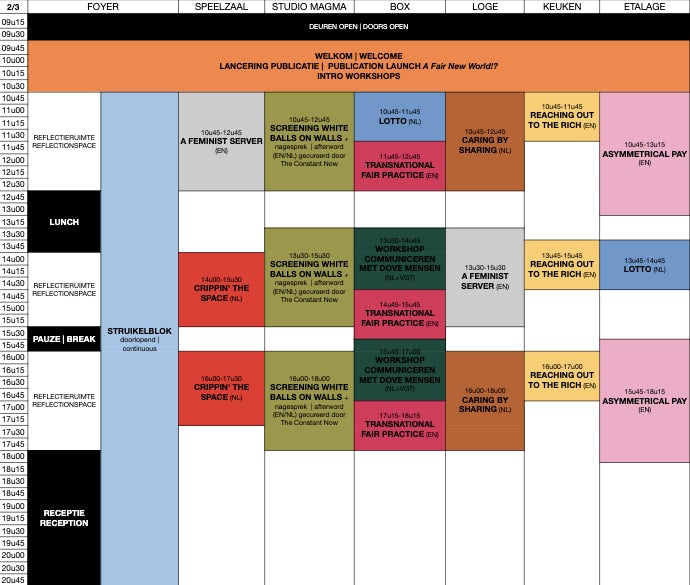Closing event: A Fair New World?!

AFNW (c) by Sadrie Alves for Kunstenpunt
Would you like our arts field to be more sustainable, more inclusive and more solidary? Join us at the closing event of A Fair New World?!
With A Fair New World?!, Kunstenpunt | Flanders Arts Institute explored concrete ways of working toward a more sustainable, more inclusive and more solidary arts world. We combined this with a series of four open calls: A Fair New Idea?!
Curious to know about the results? Join us on Thu the 2nd of March at Theater Antigone in Kortrijk, where we share all our learnings and organise hands-on workshops.
On that same day we will present the end publication of this two-year trajectory: Art, crisis and transition: A Fair New World?!
Register here (for free) for the final event
Program

Workshops and tools on the theme Fair Practices
Caring by sharing – Common Income
Common Income tests systems of mutual financial solidarity. We share inspiring practices from within Belgium and abroad for a fair (re)distribution of money. Together we brainstorm on models to reduce precarity among artists through the collective sharing of income.
Toolbox for Asymmetrical Pay
The Toolbox for Asymmetrical Pay helps us to discuss the fair distribution of a project budget. Besides formal pay scales and the equal payment principle, other parameters are considered, such as individual needs or privileges. The resulting “unequal” distribution can offset structural inequalities. The toolbox has three steps that we will test during this workshop. What works, what doesn’t, and are there any blank spots?
Lotto
Let’s play Lotto! A game where we decide together where and how money is distributed. Participants anonymously contribute a small sum based on what they can spare. Can Lotto make us think differently about money? Can chance create opportunities, redistribute money fairly, better serve collective and/or individual needs? You can bring cash: a note, change or nothing. What happens with it, is part of the session.
Reaching out to the Rich
Based on anonymous interviews with people whom from our perspective we regard as rich, we discuss the complex relationships with wealth in the arts. Participants take turns representing “rich people”. Welcome to a sensitive session of ‘Money Moments’, conversations on how we view money, material resources and their distribution.
Cases on the theme International and Sustainable
Transnational Fair Practice
Using fictional cases, we discuss cultural, political and financial inequalities in international collaborations. What is fair, what could be done better and how, what inspiring examples and practices are out there? The starting point is The Letter of Transnational Fair Practice, written by the working group “International and Sustainable” of A Fair New Idea?!
Workshops around the theme Digitalisation
“A feminist server is a safe space for people who want to emancipate themselves by consciously using technology in their artistic practices, activism, social engagement, etc.. In this work session, we translate pieces from the trans*feminist wishlist together. We delve in meanings, knowledges and values of the wishlist and reflect how we could relate with our practices.”
https://systerserver.org, https://anarchaserver.org, http://terminal.leverburns.blue/
Activities around the theme Diversity in the Arts
Stumbling Block
In this installation, you will experience what it is like not to be able to rely on all your senses. It makes you more aware of the privileged position of people without disabilities. In this way, Stumbling Block advocates for a more inclusive approach in the arts.
Communicating with deaf people
How do you communicate with deaf and hard-of-hearing people if you do not know sign language? Serge Vlerick teaches you the principles of sign language and gives additional tips. From his lived experience, he teaches you how deaf and hearing people can work together in artistic processes.
POC POC Who’s there?
Magali Elali (POC POC who’s there?) invites you to view the documentary White balls on walls. When director Sarah Vos started filming, about 90% of the art in the Stedelijk (Amsterdam) was made by white men. Director Rein Wolfs believed this should change, but that turned out to be easier said than done. An IDFA-nominated period piece of historical and cultural institutions’ struggle with their lack of diversity. After the screening, Flanders Arts Institute facilitates a peer to peer discussion to exchange impressions, experiences and tips.
Cripping The Space
The CRIP movement views handicap as a cultural model, a lense through which to critically rethink society. Cripping The Space presents a first version of their charter. Get together with members of the CRIP community to discuss needs and possibilities regarding infrastructure, communication, representation, and production logics. Contribute to an ambitious and feasible charter tailored to the CRIP community and the arts sector!
Register here (for free) for the final event
Contact
The workshops have a limited capacity. Interested in a workshop that is fully booked? Or do you have questions about accessibility, program or other comments?
Mail to jannis@kunsten.be. Very much looking forward to receiving you!


